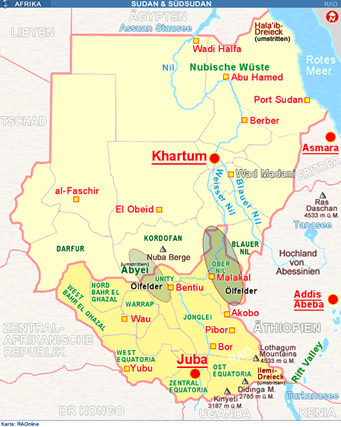| Welt: Länderinformationen |
 |
Südsudan |
|
 |
Südsudan |
|
| Afrikca - South Sudan |
 |
| Sudan-South Sudan Dialogue Group Commits to Strengthening Peace |
 |
Among Border Communities
"When we see the faces of the joint Dialogue Group we see peace coming to us."
Mr. Awet Kiir Awet, Aweil East County Commissioner, Northern Bahr el-Ghazal
The Sudan-South Sudan Dialogue Group visited the Tamazuj area in Northern Bahr el-Ghazal State from November 7-9, 2013. The objective of the visit was to advance people-to-people dialogue and specifically to learn from the experiences of the Dinka Malual and their interactions with neighboring Misseriya and Rizeigat tribes.
 |
| Our richest interactions included representatives from intercommunal Peace Committees, Chambers of Commerce, and traditional leaders. Warawar Peace Market and Majok Yinth Thiou serve as commendable examples of peaceful trade and coexistence, based on a mutual respect for each other as neighbors. As said by the Chamber of Commerce representatives, "We have tried war and gained nothing; now we must try peace."
Many lessons can be learned and applied throughout the Tamazuj region, particularly as it pertains to freedom of movement. It is clear from the people with whom we interacted that infrastructural development is critical to economic progress, peace, and stability. We were impressed by the generous hospitality extended to us by the State Government and the people of Northern Bahr el-Ghazal, and we will forever remember the countless faces of children singing for peace and prosperity. |
|
The Dialogue Group is a collaborative initiative between the Ebony Center for Strategic Studies in Juba and the Future Studies Center in Khartoum. General Lazaro Sumbeiywo and Ambassador David Kapya serve as co-conveners, facilitated by The Carter Center.
The work is generously supported by the Royal Norwegian Embassy in Juba and Humanity United. We also extend our gratitude to VISTAS and USAID for their expertise and support throughout this border visit.
As shown by the outcome of the recent presidential summit between President Salva Kiir Mayardit and President Omar al-Bashir, the bordering states are not only the frontlines for war but the essential ingredients for peace. We stand ready to support the joint presidential proposal to reconvene the Governors Forum along the border, as the Tamazuj area is central to realizing two viable states at peace between and within themselves.
"Direct people-to-people exchange will strengthen cooperation and bring lasting peace between and within the two Sudans."
General Lazaro Sumbeiywo, Chief Mediator of the 2005 Comprehensive Peace Agreement
 |
| Source: The Carter Center , Nov. 9, 2013 |
Carter Center Launches Dialogue Initiative Between Sudan and South Sudan
The Carter Center has launched a series of nongovernmental dialogues between prominent leaders from Sudan and South Sudan to strengthen peace and create lasting understanding between the two countries.
The one-year project, in partnership with the Future Studies Center in Khartoum and the Ebony Center for Strategic Studies in Juba, provides a forum for key individuals to produce practical and achievable ideas toward those goals. General Lazaro Sumbeiywo, chief mediator of the 2005 Sudan Comprehensive Peace Agreement, will facilitate the dialogues, which complement ongoing international and regional peace efforts between Sudan and South Sudan under the auspices of the African Union.
"The Carter Center aims to support progress already being made toward implementing the nine agreements reached in September 2012 to resolve issues about oil, citizenship, and border security," said Carter Center Conflict Resolution Program Assistant Director Itonde Kakoma.
 |
| Source: The Carter Center , March 28, 2013 |
"Waging Peace. Fighting Disease. Building Hope."
A not-for-profit, nongovernmental organization, The Carter Center has helped to improve life for people in more than 70 countries by resolving conflicts; advancing democracy, human rights, and economic opportunity; preventing diseases; improving mental health care; and teaching farmers in developing nations to increase crop production. The Carter Center was founded in 1982 by former U.S. President Jimmy Carter and his wife, Rosalynn, in partnership with Emory University, to advance peace and health worldwide. The Carter Center began working in Sudan in 1986 and for more than 20 years the Center has focused on improving health and preventing and resolving conflicts in Sudan. Please visit www.cartercenter.org to learn more about The Carter Center.
| Links |
 |
 |
 |
Externer
Link |
| Weitere Informationen |
 |
| RAOnline: Weitere Informationen über Länder |
|



